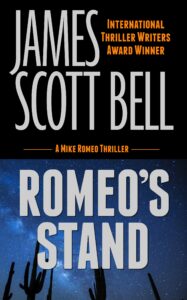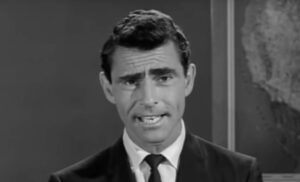by James Scott Bell
@jamesscottbell
Submitted for your approval, the greatest TV show of all time: The Twilight Zone.
It was the brainchild of Rod Serling, who served as executive producer and host of the anthology series. He had a voice like a modulated tension wire, with which he delivered the intro and outro of each episode. He also wrote 92 of the 152 scripts, an amazing output considering the fresh twists and turns that were the hallmarks of the Zone. Two other prolific contributors were Charles Beaumont and Richard Matheson, each of whom wrote some of the most memorable offerings. With writers like that it is no wonder the show was high in the ratings from 1959 to 1964.
And it’s a gift that keeps on giving, as each new generation gets to discover it via the July 4th “marathons” on the Syfy and Heroes & Icons networks, not to mention streaming. You’ll also see many famous actors early in their careers, like Robert Redford, William Shatner (“There’s a man on the wing!”), Robert Duvall, Jack Warden, Martin Landau, Leonard Nimoy, Elizabeth Montgomery, Charles Bronson, Lee Marvin and on and on. Sometimes the actors were in the twilight of their careers, like Ed Wynn and Buster Keaton.
I was a bit too young to appreciate the original airings, but the show has never been out of reruns. When I did see them, the impact was palpable.
I’ll never forget the profound gut punch I felt when I first watched “Time Enough at Last” (written by Serling) which is consistently voted the most memorable episode. That’s the one with Burgess Meredith, and I shan’t get within miles of revealing the twist. Hunt it down and watch before you read anything about it. (This should be your ironclad rule for any episode of the Zone!)
Equally stunning is the other episode that gets the most votes, “Eye of the Beholder” (Serling).
For you youngsters out there who’ve never seen a Zone, let me say I envy you! You’ve got some incomparable experiences coming. As a public service, I shall give you my personal list of favorite episodes (adding to the two just mentioned):
- “The Howling Man” (Beaumont)
- “Nightmare at 20,000 Feet” (Matheson)
- “The Hitch-Hiker” (Serling)
- “Perchance to Dream” (Beaumont)
- “The Monsters are Due on Maple Street” (Serling, and an episode that absolutely speaks to us today)
- “It’s a Good Life” (Serling)
- “To Serve Man” (Serling and Damon Knight)
And my all-time fave, the second episode of the first season, written by Serling, “One for the Angels.” I shall give you here Serling’s outro which does not contain spoilers, but sums up the heart of the episode:
Lewis J. Bookman, age sixtyish. Occupation: pitchman. Formerly a fixture of the summer, formerly a rather minor component to a hot July. But, throughout his life, a man beloved by the children, and therefore, a most important man. Couldn’t happen, you say? Probably not in most places – but it did happen…in the Twilight Zone.
I’ve long thought a good personality test would be knowing a person’s favorite Zone. So what does this episode tell me about me? That I’m a lot like Rod Serling. He had a soft heart and many of his episodes end on a redemptive note. That’s me. I love redemption. And justice.
Which reminds me that Serling wrote the script for one of my favorite political thrillers, Seven Days in May. What a cast! Burt Lancaster, Kirk Douglas, Fredric March, Ava Gardner, Edmond O’Brien, Martin Balsam. I won’t give any spoilers here, but if you like you can hop over to my Substack and see what I wrote about it (reproducing one of the great movie lines of all time!)
The lesson here is that twists and turns that are tightly woven into the plot are the golden threads of reading pleasure. But what makes that gold truly glitter is heart.
Maybe you’re not a softie. You still have a heart (I’m assuming). What is it you care most deeply about, besides selling books? Tap into it. Draw from it. Make it thrum throughout your work.
Rod Serling came to prominence in 1950s television, with a special empathy for the working stiff. Several of his episodes dealt with the pressures on executives and salesmen. “A Stop at Willoughby” is a notable example. Here’s the intro:
This is Gart Williams, age thirty-eight, a man protected by a suit of armor all held together by one bolt. Just a moment ago, someone removed the bolt, and Mr. Williams’ protection fell away from him, and left him a naked target. He’s been cannonaded this afternoon by all the enemies of his life. His insecurity has shelled him, his sensitivity has straddled him with humiliation, his deep-rooted disquiet about his own worth has zeroed in on him, landed on target, and blown him apart. Mr. Gart Williams, ad agency exec, who in just a moment, will move into the Twilight Zone—in a desperate search for survival.
Here’s an exercise: Write a Twilight Zone intro and outro for your WIP. This will tell you directly whether you’re tapping a vein or just spinning your wheels hoping for traction.
So what is your favorite Zone? (Try to avoid spoilers if you can, for there may be a young writer out there who has the series waiting to be binged.)
What does your favorite episode tell you about yourself and your writing?
***
If you’re interested in what made Rod Serling tick, I highly recommend you take twenty minutes to watch this interview from 1959, back when Mike Wallace and his guest could light up and carry on a meaningful and substantive conversation. Serling was intelligent, articulate, self-aware and honest about what he wanted to be as a writer. One of my heroes.






